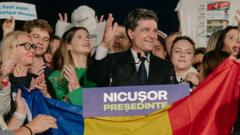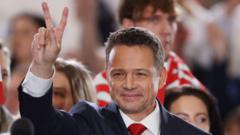Karol Nawrocki, a historian running for president in Poland, has drawn heavy criticism for disguising himself as a fictitious author, Tadeusz Batyr, to promote his own book. The incident has incited widespread mockery on social media, and analysts weigh the potential repercussions of this controversy on his electoral chances.
Polish Presidential Candidate Faces Ridicule Over Literary Deception

Polish Presidential Candidate Faces Ridicule Over Literary Deception
Karol Nawrocki, a candidate for the presidency of Poland, is mocked for previously disguising himself to promote a book under a pseudonym, raising questions about his campaign authenticity.
Karol Nawrocki, a contender for the presidency in Poland, is currently under scrutiny following the revelation of a bizarre promotional stunt from several years ago. Known to have previously posed as his own literary persona, Tadeusz Batyr, Nawrocki disguised his appearance, appearing with a blurred face on television, extolling the virtues of his book that depicted the life of a gangster amidst the tumult of 1980s communist Poland. Now, Nawrocki’s actions are at the forefront of public discourse, generating humor and disbelief across Polish social media platforms.
This uproar has gained momentum particularly because Tadeusz Batyr was not just a character in a fictional narrative, but a pseudonym created by Nawrocki himself. His earlier attempt to maintain a facade was compounded by a now-scrutinized social media post wherein he asserted that Batyr had sought his expertise on organized crime in Poland—a claim that has led to further ridicule as the details surface about his self-laudatory efforts.
The Polish presidential race is heating up with Nawrocki representing the right-wing Law and Justice (PiS) party, currently trailing behind Warsaw Mayor Rafal Trzaskowski of the Civic Coalition faction. This coalition is supported by Prime Minister Donald Tusk and is positioned as pro-European and Atlanticist, particularly amid heightened geopolitical tensions due to the ongoing conflict in Ukraine.
Political analysts note that Nawrocki's quirk with contender Batyr may reflect deeper concerns about authenticity amongst voters. As Poland's role in military support for Ukraine strengthens, the stakes in this election rise. Analysts stress that this election may present vital implications for domestic policies such as abortion rights and same-sex marriage, issues which hinge on legislative support that Nawrocki's party might influence.
With electoral prospects narrowing for Nawrocki, he has intensified efforts on the campaign trail, seeking to regain an edge among voters who might be swayed by either his academic credentials or the shadowy narrative of his disguised persona. The next steps in the campaign will reveal whether the public stands behind Nawrocki's controversial past or aligns with Trzaskowski’s vision for Poland’s future.


















